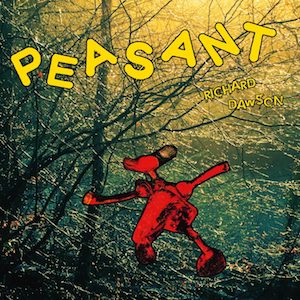 Richard Dawson – Peasant
Richard Dawson – Peasant
Weird World/Domino Records – 2 June 2017
Let’s get one thing clear: even before the release of this astonishing album, Richard Dawson’s relationship with what we might describe as folk music was ambiguous and difficult to pin down. On the one hand, there was the fiercely local delivery – the raw Newcastle accent, the place-aware lyrics – that pointed to parochial roots of traditional music. On the other, the songs themselves were often pieced together like abstract art, phrases grasped out of the wind and bound together with a touch that could be jubilant or melancholic, but was always uncompromising. His instruments of choice include broken guitars, DIY saxophone and iPhone apps, the result sounding like a combination of Louis Killen, Captain Beefheart and John Cage.
On Peasant, Dawson has taken that dichotomy to its logical extreme. It is, in a way, a concept album: each song deals with a different member of a seventh-century Northumbrian community. But such a simplistic description of the concept sells the contents short. Tellingly, Dawson has compared Peasant to the paintings of Bruegel the Elder, in which there is no single narrative but layer upon layer of individual stories, each one apparently tiny but each equally important. And in Dawson’s hands, the music that describes each of these lives is thrillingly different.
Take for example the opening track, Herald. It begins in a shimmering drone – a kind of musical sunrise – before individual, discordant horn notes make themselves known, conversing with each other in a language that sounds both sad and funny. As heralds go, it’s an ambivalent one. This isn’t simply the dawn of a wondrous, bright new day. It is followed by Ogre, in which melodic acoustic guitar and communal voices entwine with Dawson’s own cracked and powerful singing, peaking in a coda that conjures up occult ceremony or pagan ritual.
Soldier too begins with a sweet acoustic guitar melody, but the voice here belongs to a single, doomed narrator. The song’s chorus, ‘I am tired, I am afraid/My heart is full of dread’, is one of the simplest, most affecting moments on the album, particularly when, in the final reckoning, ‘dread’ becomes (if only temporarily) ‘hope’. The song may be about a pre-medieval soldier but its concerns are universal and timeless.
Things get darker as the album progresses – the knotty tangle of guitar that begins Weaver gives way to an airier melody, but not before reminding us of the thanklessness of work and the difficulties of domesticity. Prostitute takes us further down the same path, Dawson delighting in the freedom his subject gives him to express himself in words seldom heard in modern English, and introducing a cast of ‘miscreants, malingerers, dastards and knaves’.
What is perhaps most impressive about this album is the way it invents and develops – seemingly with ease – a world, an entirely new, ancient landscape that has its own musical language. In the same way that certain authors are able to convey the ‘otherness’ of a world by tweaking the written and spoken word until it becomes unique – I’m thinking novels like Russell Hoban’s Riddley Walker or Ulverton by Adam Thorpe – Dawson molds the familiar tropes of popular and folk music with such skill that they become, viscerally, darkly, his own. Shapeshifter is only a couple of steps away from having a melody that could have been written by Ray Davies, but in Dawson’s hands it becomes a strange, otherworldly romp. Part of this is down to the striking lyrical images – ‘newts in the gloaming’, a figure wrapped in ‘northern light’ who gives the narrator a potato – but still more is indebted to the subtle melodic (and sometimes unmelodic) jumps and twitches Dawson has the audacity to make.
Throughout the album are scattered surprises that draw you further into Dawson’s world – the screech of strings that cuts through the strident march and kinetic chorus of Scientist, which may be the record’s most stirring moment, or the delightfully eldritch lyrical matter and disturbing sound effects of Hob, a song that plays with the traditional subject of favours owed to supernatural beings. Beggar is intensely personal and humane in comparison, and Dawson’s voice – at times breaking into a wracked falsetto – is at its most expressive.
Peasant’s closing statement, and perhaps its masterpiece, is Masseuse, a narrative dealing with an unearthly object – the Pin of Quib – that supposedly bestows eternal beauty. Dawson tells the story swiftly and brilliantly, juxtaposing the story’s grim details and magical themes with mundane details – a monk’s breath smells like pears. But it is the musical setting that stands out most strongly, as the guitar grates metallically and ripples peacefully in turn before a shrill chorus wails with apocalyptic fervour, like some epic prog-metal concept stripped to its barest bones. Somehow, it works sublimely, a breathtaking conclusion to a genuinely outstanding and astounding work of art.
Peasant is Out Now
Upcoming Tour Dates
Saturday 17th June
Birmingham – Supersonic Festival
www.supersonicfestival.com/
Thursday 22nd June
London – St John at Bethnal Green
www.upsettherhythm.co.uk/
Friday 23rd June
Bristol – Fiddlers
www.headfirstbristol.co.uk/#date=2017-06-23&event_id=38074
Saturday 24th June
Reading – South St Arts
www.readingarts.com/south-street/whats-on/richard-dawson
Sunday 25th June
Brighton – The Old Market
www.seetickets.com/event/richard-dawson-presented-by-dictionary-pudding/the-old-market/1082257
August 18th – 20th
Green Man Festival
www.greenman.net/

